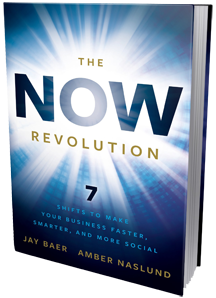 I recently interviewed Jay Baer, co-author of the brand-new book The Now Revolution and founder of the popular blog ConvinceandConvert.com.
I recently interviewed Jay Baer, co-author of the brand-new book The Now Revolution and founder of the popular blog ConvinceandConvert.com.
In this interview, we talk about social media marketing, Jay's experience writing the book and about where this crazy, fast-moving industry is headed.
Mike: Jay, what's the single most important thing that marketers or business owners need to know to be successful right now?
Jay: It's a terrific question. One of the things that we talked about a lot in the book is the fact that you have to act quickly as an organization. The example that we use to kick off the book is if you're at a hotel and you're having a bad hotel experience—it's dirty or gross or whatever—historically, you might go down to the front desk, or call the 1-800 number or write a letter.
 Now you can just dial up Yelp or TripAdvisor and leave a bad review or a tweet in two seconds. Now that particular hotel has to respond to whatever you're doing as a consumer. Every customer is a reporter now.
Now you can just dial up Yelp or TripAdvisor and leave a bad review or a tweet in two seconds. Now that particular hotel has to respond to whatever you're doing as a consumer. Every customer is a reporter now.
In a world like that—where every customer is a reporter—each employee ends up having to be in marketing. Your company has to move so fast, to capitalize on both the good and the bad, that you really must have an incredibly strong and consistent corporate culture.
We don't have time as businesses anymore to call a committee meeting and talk about what we're going to do about this tweet or this blog post or this Yelp review. You have to empower your people in the organization to make decisions that are culturally appropriate for your organization.
We believe that culture is the most important factor around social participation and doing social media right. You have to focus on how your company is going to be social, and less about how your company is going to do social.
Mike: What you're saying is that speed is the thing you want people to take home, and it's important for them to respond. Secondly, that every customer or every prospect who has a bad experience is like a reporter. They can let the world know about their experience and that can be a bad thing. Thus, everybody in your organization needs to be like a marketer and respond quickly.
What does this mean to someone who is a small business owner?
Jay: From the small business perspective, where you may not have dozens of people in your organization, it means that you have to be a multitasker. You have to be operating your business while simultaneously listening to the social conversation. Not just from a response perspective—waiting for somebody to mention you—but looking for opportunities.
 We talk a lot about the “opportunity economy” in the book and the ability for companies to find ways to interact with individuals on the social web in a way that's contextually appropriate and relevant.
We talk a lot about the “opportunity economy” in the book and the ability for companies to find ways to interact with individuals on the social web in a way that's contextually appropriate and relevant.
Let's say you own a volleyball camp in California. You set up Twitter searches around the search term anyone know + volleyball. You're going to find people who are asking questions about volleyball—some of those questions you can answer as an organization, and some of those people whom you help with those answers may end up being customers.
Mike: Something else you talk about in your book is how social media is kind of like the new telephone. What exactly do you mean by the new telephone, and what does this mean for businesses?
Get World-Class Marketing Training — All Year Long!
Are you facing doubt, uncertainty, or overwhelm? The Social Media Marketing Society can help.
Each month, you’ll receive training from trusted marketing experts, covering everything from AI to organic social marketing. When you join, you’ll also get immediate access to:
- A library of 100+ marketing trainings
- A community of like-minded marketers
- Monthly online community meetups
- Relevant news and trends updates
Jay: That's actually a paradigm that was started by Amber Naslund's employer, Radian6. Amber is my co-author and the vice president of social strategy for Radian6, the social media listening software company that many Social Media Examiner folks may have heard of. Her CEO, Marcel LeBrun, developed the metaphor of the social media telephone.
We think it's particularly apt because customers are increasingly turning to the social web both to punish and praise brands. You see, “Thanks very much Southwest Airlines, Dunkin' Donuts, Social Media Examiner,” or “Convince and Convert,” or anything else, as well as criticism.
So the same way that your actual telephone in your organization has both good news and bad news on the other end of the line, the social telephone does as well.
The other way that metaphor makes sense is that we believe over time, the same way that everybody in your organization now has an email address and a phone on their desk, everybody in your organization will eventually be active in social media in some way, shape or form. In fact, the guys at CoTweet, a client of mine, really believe that eventually most folks will have two different Twitter handles. They'll have a personal and a business Twitter handle, the same way that most of us have a personal email and a business email address.
Mike: It's quite interesting, this metaphor of the new telephone, because if you think about it, you have people now who have iPads, iPhones and Android devices on their person every waking moment of the day and even when they're sitting on the couch. The only time they don't really have it with them is when they're sleeping. So it seems as though the consumer or the customer or the prospect is now “on” all the time.
That's really a paradigm shift for businesses because customers are active whether they're on the couch or stuck in traffic. In the past when they were home, they were dealing with personal stuff, and when they were at work, they were dealing with business stuff. Now it seems to be all the time, and means a shift for businesses, doesn't it?
Jay: Oh, clearly. Social media doesn't stop at 5 o'clock and it doesn't stop on Friday. In fact, there have been lots of studies that show there's actually more sharing behavior on Facebook on weekends because people are using it a little bit more personally and more likely to share content, so you're exactly right.
If you look backwards, every time new technology was developed, we fundamentally changed our businesses to meet that challenge.
Yet we have not fundamentally changed our businesses to meet the social media challenge in any way. What we decided to do was put together a Twitter account and throw up a Facebook fan page and maybe a blog, and call it good—and that's not going to get it done.
When every customer is a reporter and it's a 24/7 world, we're just scratching the surface of what businesses are going to have to do, so we wanted to write a playbook that shows businesses what they're going to have to do over the next two to five years to transform themselves from the inside out to meet the challenges of the Now Revolution.
Mike: This is pretty mind-blowing. Talk to me about a story in particular, or a business that you discovered in the process of writing the book that might be doing this right. Is there any particular business that stood out in the process of crafting this book?
Jay: Almost every example in the book is of a small- or medium-sized business. I would say 90% to 95% of the examples in the book are purposely from small- and medium-sized businesses because we didn't want to write a book for Ford or IBM.
One that I like best is Martell Home Builders. They're in Moncton, New Brunswick, Canada. The owner is Pierre Martell, a young guy. They've been in the homebuilding business for four years, and while the Canadian homebuilding market hasn't had the catastrophic declines that we've had in the U.S., it certainly hasn't been an easy road.
When Martell first started out, they had to rely quite heavily on realtors to bring in prospects and help them drum up interest for their houses. That first year, 92% of all of their sales were through realtors, so they were paying commissions, and commissions in Canada are higher even than they are in the U.S.
Pierre decided that they ought to tell their own story, instead of having realtors tell their story. “He was prodded along by his brother, Dan Martell, who is actually the CTO of Flowtown, a company I think you're familiar with, and some of your readers and listeners may be as well. Dan said, “You've got to get on this social media train,” and convinced him to do it.
Mike: Sure, the rationale was, “If we can sell a house without a commission, we just take most of that money and return it to the company,” right?
Jay: Precisely. They started telling stories about the organization in a really fantastic blog, and the blog isn't really about them at all. It's about winterizing tips and what you can do in New Brunswick, so it's really fun marketing—it's “unmarketing,” as Scott Stratten would call it. Pierre has a very successful Twitter account where he just talks about relevant issues and helps people and does it in a very authentic and natural way.

Discover Proven Marketing Strategies and Tips
Want to go even deeper with your marketing? Check out the Social Media Marketing Podcast! Publishing weekly since 2012, the Social Media Marketing Podcast helps you navigate the constantly changing marketing jungle, with expert interviews from marketing pros.
But don’t let the name fool you. This show is about a lot more than just social media marketing. With over 600 episodes and millions of downloads each year, this show has been a trusted source for marketers for well over a decade.

But then they do some crazy stuff. This is the one that really blew us away. Their foremen, who are actually out there helping customers and building houses, all have GPS tracking devices in their work trucks, so if you're a customer of Martell's and you ask, “Where is the guy? He's supposed to come over here and fix my ceiling,” or whatever, you can dial up the web page and see where his truck is at any time.
They have completely adopted this 2.0, storytelling, authentic, executional approach, and two years later, they went from 92% of their deals through realtors to 12% of their deals through realtors and a 300% increase in sales.
Mike: Just so I understand, they decided to go ahead and blog and create outstanding content that was going to be really valuable to their community—their prospective buyers, if you will—and probably an even larger audience. A lot of people found great value in that, and some of them said, “I want to learn more about these guys,” and that's how it got started as far as getting the word out?
Jay: Yes, everybody just comes directly to the company.
Mike: And then they employed some really cool full transparency: “If you want to know where we are, this is where we are.”
Jay: Yes, because you're talking about a huge purchase, and the psychology of homebuying is you're always nervous. So what they've done is humanize the company. They've reduced the perception of risk by putting together all these tracking mechanisms and date guarantees, and you can find your foreman, so they've created humanization.
As a result, what they have now are direct sales—people come in and say, “I don't need to hear any more. I want to buy a house from you because I believe in your company.”
One of the success metrics they use is the time to close a sale. When you're trying to sell a house, it can be hours and hours, and Pierre says that it used to take them three or four hours, sometimes as many as eight hours. He said their new record from somebody walking in the office to signing a house agreement is 35 minutes.
Mike: Their blog has probably enabled them to build a lot of trust with people before they even get to the point of purchase.
Jay: They're already sold when they walk in the door.
Mike: That's outstanding. Their profits must have gone through the roof.
Jay: Yes, because that money all drops to the bottom line. Not paying those commissions is essentially free revenue for them.
Mike: What would you recommend for someone who wants to get smarter about social media? Where exactly would you say they should start? What would be some smart tips for a business to get this thing underway wisely?
Jay: Once you've moved past the question of “Should we do social media?” and you've moved on to “How should we do social media?”, I always then start to look at it through a metrics prism. If you accept the premise that you should be doing social media, to what end? How are you trying to improve your business? Are you trying to sell stuff? Are you trying to sell the same amount of stuff, but have a higher average order? Are you trying to increase loyalty? Are you trying to turn your existing customers into a volunteer marketing army?
Each of those things is significantly different at the execution level in terms of social media programs, so you have to really understand why you're doing social media, what you're trying to achieve as an organization, and then put together success metrics that help you determine whether what you're doing now is accomplishing that.
There's a chapter in the book about success metrics and how to pick the right ones. If your objective is to create loyalty among your existing customers and you hope they will buy from you again and again, Facebook is a particularly good approach because Facebook is a brand community.
In large measure, your Facebook audience is already converted; otherwise, they wouldn't have become your fan on Facebook. The people who like you on Facebook are people who actually like you in the real world, so that's a perfect place to create loyalty, repeat customers and repeat purchases.
Yet a lot of companies think that Facebook is where they're going to create new customers—that it's a customer acquisition medium, when quite clearly it's not.
Mike: It's a community tool, really.
Jay: Yes, but a lot of companies don't see it that way. They see social media in general as primarily a new customer acquisition mechanism. I think for almost all companies, it really is better as a loyalty and retention mechanism. So having that sort of clear-headed approach about what you're trying to accomplish and the kind of metrics that you can put in place and know whether it's working, I think is really the bridge behavior between “Okay, we've experimented” and getting more serious about it.
Mike: I just want to reiterate something you said that I think is ultra-wise—the why and the what. So many businesses aren't sure why they're doing social media. They're doing it because everyone else seems to be doing it. But what's the real reason and what in the world do they hope to achieve?
Jay: Yes, because it ain't free, right?
Mike: You're spending a lot of labor to do it.
Jay: I stole this line from Charlene Li, but social media is not inexpensive; it's just different expensive.
Mike: So the question is why you're doing it, and if you really don't know, then you're not going to find a lot of value in it because you won't know whether it's successful or not. I'm with you 100% on that.
Looking down the road two years from now, which I know is a long time in the world of social media, in your mind how is the landscape going to change for marketers?
Jay: I'd say in three areas. First is decentralization; we talked about that a little bit earlier. Social media will be a skill, not a job. You won't have a social media department any more than you have a typing department. Someday it will seem crazy that you had one person in your company listening using Radian6 or a tool like that. That will seem insane. Eventually it'll be on everybody's desktop and listening will be part of everybody's job, as will responding.
The second one is integration. We'll start to see more of a convergence of social and CRM and email and other communication tools, a lot of the R&D being done out there by the smart software company that is trying to bolt together other parts of marketing, which will make it a lot more powerful.
Then I think the third piece that I'm really excited for is optimizing social media; adding more of the science in social. I can do a Google AdWords campaign and figure out whether having a comma in the second line as opposed to a period has virtual impact on results, yet I can't send two different tweets to each half of my list. I can't do any sort of testing or optimization other than somewhat anecdotally in social media. That's an issue, so there are a lot of people working on it as well.
I'm really excited to see where we're going to be in two years when they really have a lot more sophisticated data and testable hypotheses and things like that. It's going to make social a lot more like email in terms of having that availability of data and testability and optimizing, which will make it a lot easier for CEOs and company owners to understand whether it's working, just like we talked about. When you've got richer data, you can make better decisions.
Mike: Jay, my last question is if people want to learn more about you and your book, where would they go?
Jay: The book is called The NOW Revolution: 7 Shifts to Make Your Business Faster, Smarter, and More Social, obviously available at Amazon, Barnes & Noble, Borders and anywhere books are sold. The website for the book is NowRevolutionBook.com. Also, on Facebook, just search for “Now Revolution.”
You can find me at ConvinceandConvert.com or on Twitter at jaybaer, and on occasion, you can find me on the world's greatest website, SocialMediaExaminer.com.
Mike: Jay, thank you very much for some really interesting insights that you provided myself and fans of Social Media Examiner today. I really appreciate your time.
Jay: Always a pleasure. I appreciate it.
Listen to the rest of this interview (below) to hear some of the amazing ways Jay promoted his book and how he thinks the world of social media will change for marketers two years from now.
[audio:JayBaer.mp3]What do you think of Jay Baer's ideas? Leave your comments in the box below.
Attention Agency Owners, Brand Marketers, and Consultants

Introducing the Marketing Agency Show–our newest podcast designed to explore the struggles of agency marketers.
Join show host and agency owner, Brooke Sellas, as she interviews agency marketers and digs deep into their biggest challenges. Explore topics like navigating rough economic times, leveraging AI, service diversification, client acquisition, and much more.
Just pull up your favorite podcast app, search for Marketing Agency Show and start listening. Or click the button below for more information.

